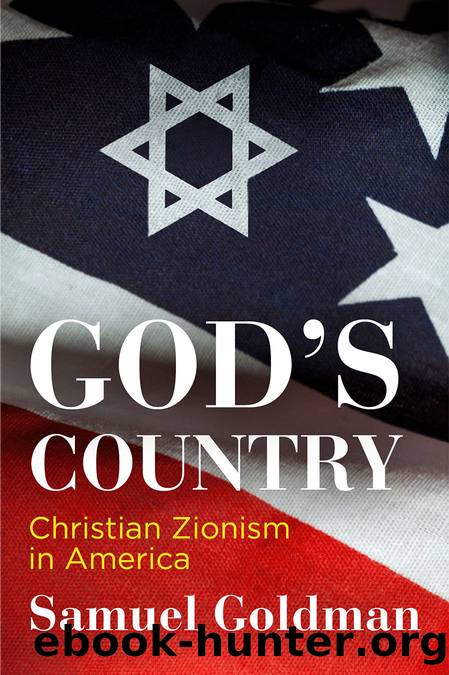God's Country: Christian Zionism in America by Samuel Goldman

Author:Samuel Goldman [Goldman, Samuel]
Language: eng
Format: epub
ISBN: 9780812294941
Google: owVKDwAAQBAJ
Publisher: University of Pennsylvania Press
Published: 2018-02-02T07:06:49.908215+00:00
Judeo-Christian Civilization and the Cold War
On December 22, 1952, Dwight D. Eisenhower delivered a speech at the Waldorf Astoria Hotel in New York to the Freedoms Foundation, an educational organization of which he had been appointed honorary chairman. Recounting wartime discussions, the president-elect described the difficulty he experienced in explaining American democracy to Soviet military commander Georgy Zhukov. According to Eisenhower, Communists like Zhukov could not understand America because âour form of Government has no sense unless it is founded in a deeply felt religious faith, and I donât care what it is. With us of course it is the Judo-Christian [sic] concept but it must be a religion that all men are created equal.â31
Eisenhowerâs remark was not widely noticed when it was delivered. It achieved proverbial status a few years later, when Will Herberg, a labor activist, sociologist, and associate of Reinhold Niebuhr, made it the centerpiece of Protestant, Catholic, Jew, his groundbreaking analysis of religion in mid-century America. In Herbergâs opinion, â[e]very American could understandâ that Eisenhowerâs statement was âthe expression of the conviction that at bottom the âthree great faithsâ were really âsaying the same thingâ in affirming the âspiritual idealsâ and âmoral valuesâ of the American Way of Life.â32 The âJudeo-Christian conceptâ was a way of including all AmericansâProtestants, Catholics, and Jewsâin a common front against Soviet tyranny.33
Judeo-Christianity had mixed implications for the new Jewish State. On the one hand, it implied that Christians were bound to Jews, and to the State of Israel, in a fundamental manner that overrode their many disputes. German-born theologian and ACPC supporter Paul Tillich answered the question âIs there a Judeo-Christian tradition?â in the affirmative.34 Among the points of agreement that Tillich identified was a common attitude toward history. Rather than a cycle or a random flux of events, Christians and Jews understood history as a process oriented toward a divine purpose.35 Herberg noted that this understanding was inseparable from the promise of return to the Promised Land: âThe destiny of Israel begins and ends in Zion.â36
On the other hand, the emphasis that Eisenhower placed on confronting the Soviet Union suggested that history pointed in a different direction. Such was the view of his secretary of state, John Foster Dulles, who had come to public attention as a Presbyterian layman, whose service included work as an advocate for Harry Emerson Fosdick in his ecclesiastical trial for heresy. For Dulles, Americaâs importance for Christianity lay in its stand against Communism.37 Jews and Judaism played only a minor role in his conception of Godâs will.38
Dulles was not hostile to Israel per se. Although he maintained connections with anti-Zionist Christian circles, he resigned from the ACJ-affiliated Holy Land Emergency Liaison Program because it was too critical of Israel.39 Even so, the Eisenhower administration sought a rebalancing of American influence in the Middle East.40 In the words of the National Security Council planning staff, âIsrael will not, merely because of its Jewish population, receive preferential treatment over any Arab state; and thereby demonstrate that
Download
This site does not store any files on its server. We only index and link to content provided by other sites. Please contact the content providers to delete copyright contents if any and email us, we'll remove relevant links or contents immediately.
A World Ablaze by Craig Harline(697)
Winning the War in Your Mind by Craig Groeschel(690)
White Too Long by Robert P. Jones(634)
In the Reign of King John by Dan Jones(633)
The Mission by David W. Brown(627)
History of the Church by Eusebius(601)
Beautiful Resistance: The Joy of Conviction in a Culture of Compromise by Jon Tyson(593)
No More Christian Nice Guy by Paul Coughlin(581)
A Spacious Life by Ashley Hales(562)
The Crusades: A History by Jonathan Riley-Smith(551)
Three Messiahs : The Historical Judas the Galilean, the Revelatory Christ Jesus, and the Mythical Jesus of Nazareth (9781450259477) by Unterbrink Daniel T(550)
The Black Church by Henry Louis Gates Jr(543)
The History of Palestine by John Kitto(511)
The Zionist Bible (BibleWorld) by Masalha Nur(509)
Why Study History? by John Fea(499)
The Tale of the Tardy Oxcart (Swindoll Leadership Library) by Swindoll Charles R(499)
Assassination of a Saint by Eisenbrandt Matt(485)
Descent Into Hell by Charles Williams(479)
The Cheese and the Worms: The Cosmos of a Sixteenth-Century Miller by Carlo Ginzburg(452)
